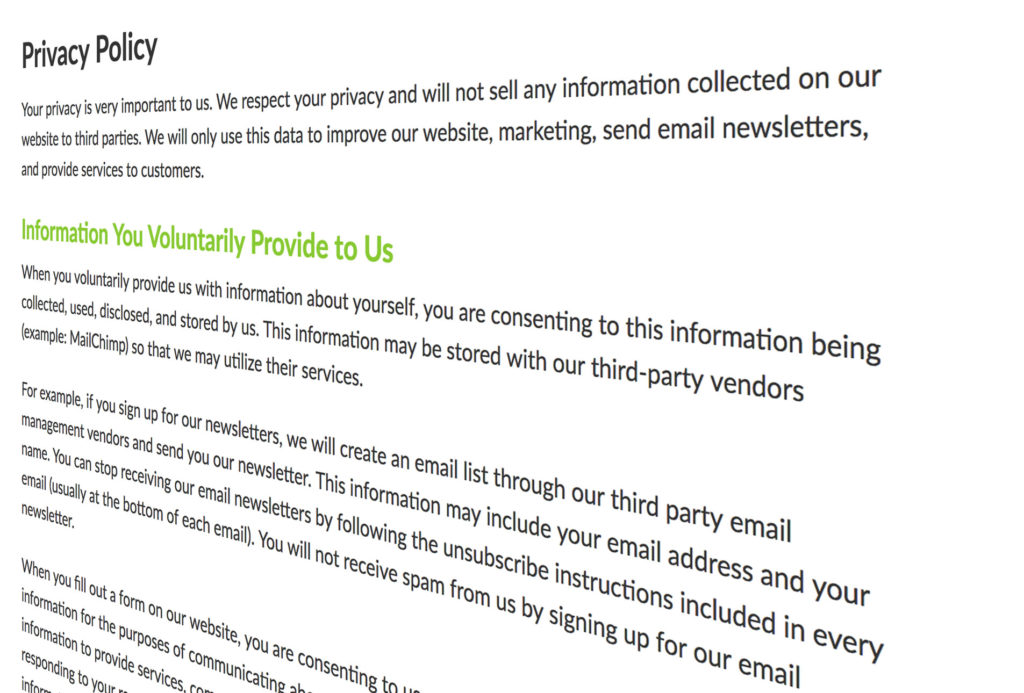 If you want your website to present a professional image to your visitors, you need to be open and clear about your business practices online.
If you want your website to present a professional image to your visitors, you need to be open and clear about your business practices online.
One of the features found on many business and corporate websites is a privacy policy, but how do you know if your website needs one?
There are a few quick questions to you should ask yourself:
- Does your website use Google Analytics?
- Does your website have a contact us form or other inquiry form?
- Do you use Cookies on your website?
- Do you have a signup box for your email newsletter on your website?
- Do you allow people to leave comments on your blog?
If you answered yes to any of these questions, then you need a privacy policy on your website.
What is a Privacy Policy?
A privacy policy lets visitors your website know exactly what information you are collecting about them as well as how you collect and use that information.
What a Privacy Policy Does for Your Customer
Having a privacy policy on your website is like shaking hands with your customer. It’s an agreement between you and your customer that you will respect their privacy. In today’s world it’s not just about how you treat your customers, but also how you treat their information.
Why Do I Need a Privacy Policy?
Not only is it important to have a privacy policy as a measure of trust for your customers, but also, in some cases, the law requires it.
Additionally, the terms of service agreements of some popular online service providers require that you have a privacy policy on your website when you utilize their products. For example, Google Analytics is a widely used service that requires you to notify the visitors to your website about how data is collected by their software.
This is an excerpt from the 2017 Google Analytics terms of service:

Read the full Google Analytics terms of service.
For the benefit of your customers, it’s better to err on the side of caution, so go ahead and write a detailed privacy policy.
Where Do I Put a Privacy Policy On My Website?
It’s a good idea to have a link to your privacy policy available from every single page of your website.
Placing the link in the header, global navigation, or footer of the website is a likely location, but it needs to be clearly visible and in a prominent location. The link to the privacy policy should be in the same font size as the surrounding text.
When using certain online services, the terms of service agreement may stipulate the placement of your privacy policy or links to it.
In this example, the privacy policy is visible in the footer on all pages of the website:

How Do I Write a Privacy Policy?
There is no one-size-fits-all wording for a privacy policy. Laws impacting these policies may differ from state to state and from country to country, so check with your legal advisor to make sure that you are meeting all of the requirements on your website. There are some laws that apply based on the age of your viewers/readers.
I asked my legal advisor about a specific website of mine, and here are some of the tips he gave me:
A good privacy policy not only protects you legally, but also builds trust with site visitors. By providing a list of the personal information you gather, and explaining how and why you use that information, you promote transparency. A privacy policy does not have to be complex, but it should be tailored to each specific website. Remember, be clear and straightforward. You don’t need an attorney to draft a privacy policy from scratch, but you should have one look it over before it goes live. Many factors influence the content of a privacy policy, but you should be careful to include specific terminology if your site processes financial transactions or utilizes advertising or remarketing services. Your attorney can tell you more.
Jay Hurdle, Hurdle Law Firm
Resources for Privacy Policies
We put together a short list of some resources that may be helpful in crafting your own privacy policy. While it is helpful to be educated about the laws and regulations regarding privacy policies, we recommend that you contact your lawyer to assist you with the creation of a policy for your website.
- Federal Trade Commission’s guide “7 Considerations for Crafting an Online Privacy Policy”
- Small Business Administration’s page on privacy law
- State laws related to internet privacy
- Is Your Website’s Privacy Policy Putting You at Risk?
Examples of Privacy Policies
- The Better Business Bureau has an example privacy notice that may give you a good place to start: https://www.bbb.org/greater-san-francisco/for-businesses/toolkits1/sample-privacy-policy/
- The usa.gov privacy policy : https://www.usa.gov/policies
Disclaimer
This article is in no way intended to provide legal advice. It is recommended that you contact a lawyer for specific information on crafting and placing a privacy policy on your website. This article does not apply to websites outside of the United States where the laws may differ.